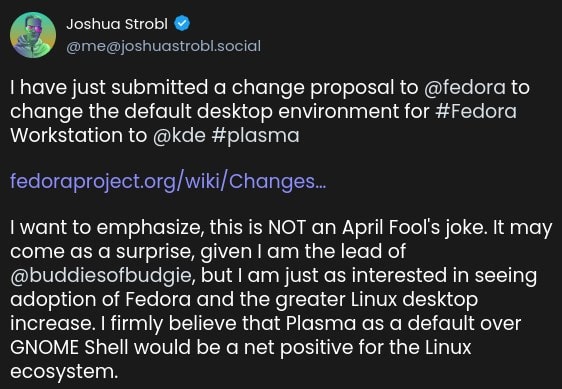Linux is fun – yes. April Fools’ Day is fun – yes. Am I thankful that the XZ vulnerability wasn’t discovered two days later, on April 1? Yes!
Enjoyment is a core aspect of the Linux ecosystem. Frankly, it’s an essential component, contributing to the charm of this beloved operating system.
In line with this spirit, every April Fools’ Day sparks an informal contest among various open-source projects to showcase their sense of humor through the most inventive pranks, presenting startling announcements.
However, while 10+ years ago this was funny, nowadays, considering users’ strong sensitivity to misleading information, it doesn’t seem so funny anymore. It’s quite common for these jokes to be misunderstood by users, leading to numerous frustrated comments on forums and social media, escalating into a tricky situation.
Because of this, some users even choose to shut down their computers on March 31 and turn them back on again on April 2 to avoid the barrage of joke-filled content that blurs the line between dependable and well-meaning but misleading information during this period.
Maybe that’s why, compared to a decade ago, nowadays, April Fools’ Day has seen a more restrained approach to releasing those “earth-shattering” headlines recently, or at the very least, they’ve become less shocking.
Recognizing the confusion that April Fools’ Day pranks have caused in the past, major players in the Linux ecosystem have ceased shocking their audiences with headline-grabbing surprises.
Instead, more subdued forms of humor are being adopted, exemplified by System76’s light-hearted announcement this year about their “Now THIS is dedication! Our Happiness Architect, Aaron getting an ultimate tattoo,” which is totally OK. I mean that, unlike before, there are no pranks related to product lines or operating systems.
Moreover, prominent Linux distributions, including Arch, which is known for engaging in April 1 antics that have garnered numerous headlines, have also abandoned this practice in recent years.
There have been notable exceptions, like iXsystems announcing their popular NAS solution would move from FreeBSD and Linux to Windows, even claiming availability in the Microsoft App Store. However, these instances are rare. However, the following announcement really confused us.
Fedora’s KDE Plasma Switch
A proposal has been made on the official Fedora project website to switch the default desktop environment for the Workstation, starting with the Fedora 42 release from GNOME and moving to KDE Plasma.
The proposal was submitted yesterday, April 1, by Joshua Strobl, one of the leaders of the Budgie Desktop project. As you can see, this is all complete nonsense.
The Fedora Workstation currently focuses exclusively on GNOME. Furthermore, Fedora and GNOME are both significantly supported by Red Hat, their primary investor and contributor. In other words – it can’t happen. However, according to Joshua Strobl’s post, this is not an April Fool’s joke.
“I want to emphasize, this is NOT an April Fool’s joke. It may come as a surprise, given I am the lead of @buddiesofbudgie, but I am just as interested in seeing adoption of Fedora and the greater Linux desktop increase. I firmly believe that Plasma as a default over GNOME Shell would be a net positive for the Linux ecosystem.”

We openly admit to feeling perplexed. So, we’re hopeful that Mr. Strobl will offer guidance in selecting one of the following two headlines for our article:
- “Fedora’s New Direction: Considering Plasma Desktop for Workstation“
- “Fedora Community, Fear Not: Just the Spirit of April Fools“
Thanks in advance for the help!
Bottom Line
Indeed, you’re welcome to consider me old-fashioned and conservative, and I won’t argue. However, I maintain that even on April Fools’ Day, it’s essential to exercise appropriate caution, especially when the impact of the shared information on numerous users is uncertain.
From this perspective, it’s encouraging to see that the stance of well-regarded figures in the Linux ecosystem has significantly shifted in recent years.
Today, even headlines created for entertainment purposes, presented entirely with the best intentions, acknowledge their potential impact and aim to remain within acceptable boundaries – even on April 1. And yes, there will always be exceptions.
